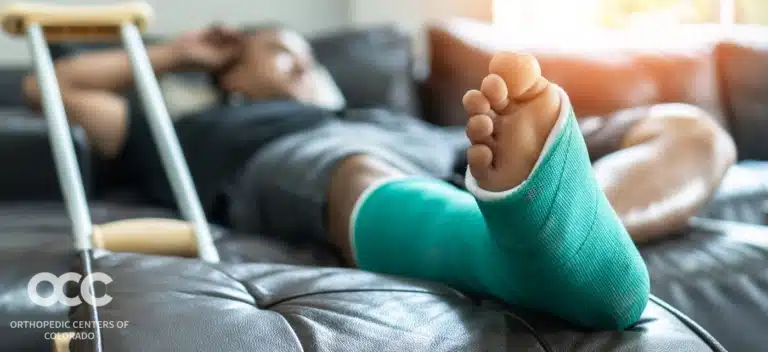A fracture of the calcaneus, or heel bone, is a serious and disabling injury that can lead to longstanding problems in the foot and ankle. Calcaneus fractures can cause intense pain and make walking more difficult. Without treatment, they may worsen and further damage the broken bone. Because these types of fractures can be hard to treat, it’s imperative to get the best help from the most experienced foot and ankle specialists, like those you’ll find at Advanced Orthopedic & Sports Medicine Specialists in Denver, Parker, and Aurora, Colorado. No one needs to suffer from the pain or possible complications from this fracture.
OVERVIEW
A calcaneus fracture is one or more small breaks in the heel bone (calcaneus). They are relatively uncommon, accounting for approximately 2% of the total number of foot fractures. Most are closed injuries, meaning the skin is intact. When the skin around the fracture is broken, this may represent an open fracture, also called a compound fracture. An open fracture is an emergency that requires urgent surgery.
WHAT IS A CALCANEUS FRACTURE?
Fractures of the calcaneus may or may not involve the subtalar and surrounding joints. Fractures involving the joints (intra-articular fractures) are the most severe calcaneus fractures and include damage to the cartilage (the connective tissue between two bones). If the fracture does involve the joints, there is the potential for long-term consequences, such as arthritis and chronic pain. Fractures that do not involve the joint (extra-articular fractures) include:
- Those caused by trauma, such as avulsion fractures (in which a piece of the bone is pulled off of the calcaneus by the Achilles tendon or a ligament) or crush injuries resulting in multiple fracture fragments
- Stress fractures caused by overuse or mild injury
CAUSES
Males ages 30 to 50 fracture their calcaneal most often of any age group or sex. Calcaneus fractures are commonly suffered by roofers and climbers after a fall, although automobile accidents can also cause such fractures to the heel bone. One’s more likely to get a calcaneus stress fracture if they participate in activities or sports that involve repetitive movement, including:
- Basketball
- Dancing
- Long-distance running
- Soccer
- Track and field sports
Other factors that increase the risk of calcaneus fractures include:
- Having an eating disorder
- Using tobacco or overusing alcohol
- Working a job that involves heavy physical labor

